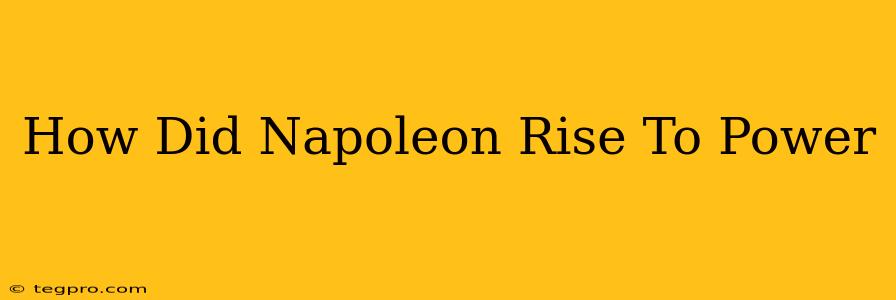Napoleon Bonaparte's meteoric rise to power remains one of history's most fascinating case studies. From relatively humble beginnings, he conquered Europe, leaving an indelible mark on the political landscape. But how did this Corsican artillery officer achieve such extraordinary success? Understanding his ascent requires examining his military prowess, political acumen, and the volatile political climate of revolutionary France.
Napoleon's Military Brilliance: The Foundation of His Power
Napoleon's military genius was the bedrock of his power. He wasn't just a skilled tactician; he possessed an intuitive understanding of battlefield dynamics and an unparalleled ability to inspire his troops. His early victories in Italy, especially at the Battle of Lodi in 1796, catapulted him to fame. These weren't just military triumphs; they were masterful displays of strategic thinking, speed, and audacity that captured the imagination of the French public.
Key Military Strategies and Victories:
- Speed and Decisiveness: Napoleon's campaigns were characterized by rapid movements and swift, decisive battles, overwhelming his opponents before they could fully react.
- Use of Artillery: He recognized the power of artillery and effectively integrated it into his battle plans, giving him a significant advantage.
- Innovative Tactics: He wasn't afraid to break with traditional military strategies, employing innovative tactics that often caught his enemies off guard. The Battle of Austerlitz (1805) is a prime example.
- Inspiring Leadership: Napoleon cultivated a fiercely loyal army, inspiring his soldiers with his charisma and unwavering confidence.
These victories weren't just about military skill; they generated crucial political capital. Each success solidified his reputation and increased his influence within France.
Seizing Political Opportunities: From General to Emperor
While military success formed the foundation of his power, Napoleon was also a shrewd political operator. He expertly navigated the turbulent political landscape of post-revolutionary France. The instability and power vacuums within the Directory (the ruling body of France after the Reign of Terror) presented him with opportunities he seized without hesitation.
Key Political Maneuvers:
- The Coup of 18 Brumaire: This carefully orchestrated coup d'état effectively ended the Directory and paved the way for Napoleon's rise to power as First Consul.
- Consolidation of Power: Once in power, Napoleon systematically consolidated his authority, establishing a strong centralized government and implementing reforms that brought stability to France.
- The Napoleonic Code: This legal code unified French law and established a system of order and justice, further solidifying his position.
- Propaganda and Public Image: Napoleon masterfully used propaganda to cultivate a powerful public image, portraying himself as a savior of France.
He understood the importance of stability and order, which resonated deeply with a nation weary of the chaos of the revolution.
The Role of the French Revolution: A Fertile Ground for Ambition
It's crucial to understand that Napoleon's rise wasn't just a product of his individual ambition; it was inextricably linked to the French Revolution. The revolution created the circumstances—the instability, the power struggles, and the yearning for strong leadership—that allowed him to seize power.
The Revolution's Impact:
- Rise of Nationalism: The revolution fostered a strong sense of French nationalism, which Napoleon skillfully harnessed to rally support for his campaigns.
- Military Expansion: The revolutionary wars created a powerful, albeit somewhat undisciplined, army that Napoleon transformed into a highly effective fighting force.
- Political Instability: The repeated changes in government created a power vacuum that Napoleon exploited to his advantage.
In essence, the revolution created the conditions, and Napoleon's genius, ambition, and tactical brilliance seized the moment.
Conclusion: A Perfect Storm
Napoleon's rise to power wasn't simply the result of one factor but a confluence of circumstances. His military genius, political acumen, and the unstable political climate of revolutionary France created a perfect storm that propelled him to the pinnacle of power. His legacy remains a complex and fascinating topic, a testament to the interplay of individual ambition and historical forces.

